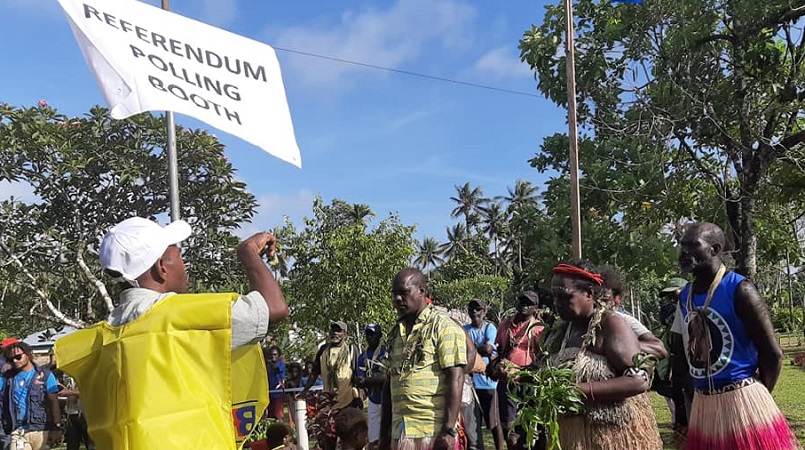
There is general consensus amongst regional and international observers following the Bougainville referendum that midway through the polls, ‘things were moving well except for minor challenges that were being ironed out by polling officials.’
“There was an atmosphere that they’ve waited long enough and want to vote, said Makereta Waqavonovono, one of the referendum observer team members for the Pacific Islands Forum.
“However, there were some concern about persons living with disabilities at polling stations where they were to vote. Things could have been organised better. I think what they are going to improve from now until vote closes next week is for the Presiding officer to send one of his/her officials to go and assist people with special needs, Waqavonovono told PACNEWS in Buka.
Mid-way through the two weeks voting, some improvements have been seen at the polling centres.
“Generally a very happy and joyous atmosphere. We saw people coming to the polling station in large numbers, including pregnant women with children standing in line and queuing-up. We believe they are being given special treatment now.
She said the urban areas of Buka and surrounding villages, people with disabilities are given preferential treatment – as observed in one of the polling centre where a woman in a wheelchair was pushed to the front to vote.
“By the same token, there were women with children standing in line in the hot sun at a soccer field. I think arrangements will be made so that women with children are given preferential treatment.
Waqavonovono observed that women and other marginalised groups were not assertive or not aware that they could ask for priority assistance at the polling centre.
On voters understanding what they voting for – the former Fijian lawyer and magistrate said voters were confident and clear about their choice.
“They are quite clear about their choice, they may not be aware of the particulars of what that the vote entails, but it seems they generally are aware of their choices.
“Not many understand what happens next, only a few do – especially the ones active in the process like the veterans who have been involved with the referendum awareness programmes. But that is the minority, said Waqavonovono.
On the main island of Bougainville, the referendum vote was much quieter and business as usual than Buka Island where the vote was welcomed with much feasting and dancing.
Papua New Guinea’s Permanent Representative to the United Nations, Ambassador Max Rai told NBC News in Buka that voting was conducted in an orderly fashion in Arawa.
“As I was driving up from Arawa people are lining up quietly and in a very peaceful manner and I am very happy with what’s going on. I think it’s the same throughout Bougainville. People want to go out and vote.
“Bougainville is a key issue for the whole country, whatever happens here will be a precedent. We must make sure that whatever the outcome, people must realise that PNG is a country with many diverse ethnic groups. Whatever the people decide it will have serious impact on PNG as a nation, said Ambassador Rai.
The United Nations has raised US$4.8 million, close to K15 million for the work to be done post referendum, revealed Ambassador Rai.
“Just before I left, I checked with the UN how much money we have raised, the actual amount is US$ 4.8 million, close to about K15 million that will be spent on post referendum phase of the Bougainville Peace Agreement. So I’m actually quite happy with that and I will continue to seek further funding so that both sides switch their commitment to ensure that there is peace and stability on Bougainville, said Ambassador Rai.
He will report back to the United Nations Secretary General when he returns to New York.
Photo by PACNEWS/Makereta Komai
